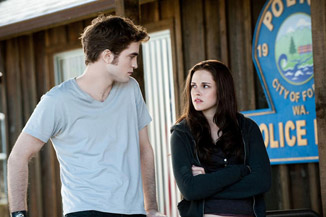|
|
Book Vs. Movie: EclipseBy Russ BickerstaffJuly 1, 2010
Meyer hangs the Twilight series so heavily on Edward, Bella and Jacob that any attempt she makes to draw interest elsewhere ends up coming across as unnecessary padding. Do we really need to find out the reason why a given character has become a vampire if that character has only appeared in a few scattered scenes? It’s difficult to imagine readers feeling any significant attachment to any of the characters outside of the central three, making Eclipse and the two novels to come before it a very limited trip into a long-running episodic story. There’s a rich tradition for thematically lightweight material like this in episodic fiction of every conceivable art form and genre, but the world Meyer weaves isn’t rich enough to truly get lost in unless one has a powerfully strong connection with its three principal characters. Outside of them, it’s pretty weak. The Movie Eclipse continues the Twilight film franchise’s track record for being reasonably faithful to Meyer’s books. Though the dialogue is, at times, every bit as bad as it’s ever been for the series, screenwriter Melissa Rosenberg seems to be comfortable enough with the source material to take liberties with it where necessary in the interest of crafting a compelling story for film. It's doubtless that many of the choices in framing and pacing different plot elements were courtesy of a very competent David Slade operating as director.
[ View other columns by Russ Bickerstaff ]
[ View other Book vs. Movie columns ]
[ Email this column ]
|

|
|
|

|
Friday, November 1, 2024
© 2024 Box Office Prophets, a division of One Of Us, Inc.


